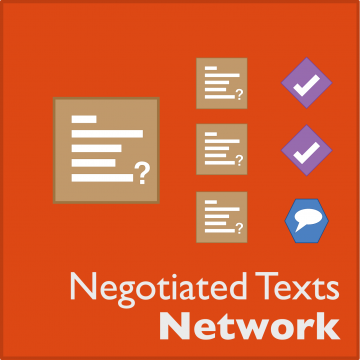Negotiated Texts

This network was funded from December 2016 to December 2018.
Some of the most critical and foundational documents of the modern world have been created not by individuals but by a formal process of negotiation, usually involving a quasi-Parliamentary procedure of committees and sub-committees, often over extended periods of time. Examples include constitutions, treaties or ordinary legislation, together with documents such as the U.N. Declaration on Human Rights, or the foundational treaties of the European Union. The records of these negotiations can be extremely challenging to read as amendment after amendment adjusts the document under discussion in ways that were obvious to participants but which are difficult for readers to visualize, and negotiations stretch over months or years.
In October 2016 the www.quillproject.net platform was launched. This platform has been built to show both the chronology of events and the hierarchy of decision-making within a process of formal negotiation, while allowing users to view a reconstruction of the state of documents available to a committee during any moment of its deliberations.
This network emphasized collaboration between projects and the integration of datasets across platforms for a seamless user experience. The launch conference for the Quill Platform showcased co-operation with educational non-profit organizations designing materials for classroom use, as well as a number of other digital research projects working on similar material but taking different approaches.
This network was building on the topics identified during the quillproject.net conference discussion, and refine and develop understanding of the problems posed by this material for researchers; promote an understanding of the existing tools for their exploration; investigate new ways to extend and integrate those tools; and explore new ways to present this category of material to a non-expert audience.
This network brought together researchers working on the records of formal negotiations, especially those using digital and statistical methodologies for research, or those seeking to use digital platforms for teaching and public engagement.
Contact:
Dr Nicholas Cole
Dr Alfie Abdul-Rahman
Convenors:
Dr Nicholas Cole
Dr Alfie Abdul-Rahman
Alex Butterworth
David de Roure
Negotiated Texts

Dr Luke Blaxill, Leverhulme Early Career Research Fellow, Anglia Ruskin University, "A War of Words? Text Mining Political Speeches in Britain in the 19th and 20th Centuries"
- Alfie Abdul-Rahman, Research Associate, University of Oxford e-Research Centre
- Nicholas Cole Senior Research Fellow, Pembroke College Oxford
- Abhishek Dasgupta doctoral student, Exeter College
- David Doyle, Associate Professor of Latin American Politics in the Department of Politics and International Relations, University of Oxford a Fellow of St Hugh’s College
- Félix Krawatzek, British Academy Postdoctoral Fellow, University of Oxford’s Department of Politics and International Relations and a Research Fellow at Nuffield College.
- David Price co-founded DebateGraph with the former Australian cabinet minister Peter Baldwin
- Radoslaw Zubek, Associate Professor of European Politics, a Tutorial Fellow at Hertford College
Sarah Martin (Adams Papers Editorial Project)
Michael Pidd (University of Sheffield)
Alexander von Lünen (University of Huddersfield)
Session II: Approaches to Large Corpora of Data
Ida Nijenhuis (Hugens ING)
Kathleen Richman (LLMC)
Session III: Creating Materials for Classroom Use
Julie Silverbrook (ConSource)
Stan Swim (Bill of Rights Institute)
Nicholas Cole (University of Oxford)
Two meetings were held to discuss Oxford’s infrastructure for Digital Humanities scholars.
- data encoding and preservation
- search tools and data discovery (both curated and automated)
- contextualizing displayed text with a larger collection
- meeting the needs of researchers in a funding climate which emphasizes the impact agenda


